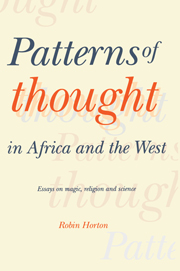Book contents
- Frontmatter
- Contents
- Acknowledgements
- Introduction
- BEGINNINGS
- MAINLY CRITICAL
- 2 Neo-Tylorianism: sound sense or sinister prejudice?
- 3 Lévy-Bruhl, Durkheim and the Scientific Revolution
- 4 Back to Frazer?
- 5 Professor Winch on safari
- 6 Judaeo-Christian spectacles: boon or bane to the study of African religions?
- MAINLY CONSTRUCTIVE
- Postscript
- Notes
- Bibliography
- Index
2 - Neo-Tylorianism: sound sense or sinister prejudice?
Published online by Cambridge University Press: 05 June 2012
- Frontmatter
- Contents
- Acknowledgements
- Introduction
- BEGINNINGS
- MAINLY CRITICAL
- 2 Neo-Tylorianism: sound sense or sinister prejudice?
- 3 Lévy-Bruhl, Durkheim and the Scientific Revolution
- 4 Back to Frazer?
- 5 Professor Winch on safari
- 6 Judaeo-Christian spectacles: boon or bane to the study of African religions?
- MAINLY CONSTRUCTIVE
- Postscript
- Notes
- Bibliography
- Index
Summary
Over the last year or two a new pejorative, ‘neo-Tylorian’, has entered the vocabulary of British social anthropologists. What error is it supposed to castigate?
The short answer seems to be that when someone in a pre-literate society answers questions about the cause of an event by making a statement concerning the activities of invisible personal beings, the neo-Tylorian (following his ancestor Sir E. B. Tylor) takes the statement at its face value. He accepts it as an attempt at explanation, and goes on to ask why members of the culture in question should try to explain things in this unfamiliar way.
To the layman, this intellectualist approach is likely to seem self-evidently sensible. To the orthodox social anthropologist, however, it is misguided in the extreme. For the anthropologist, it is the height of error to take pre-literate religious belief-statements at their face value. Such statements may be many things; but they are not really attempts at explanation, and should not be analyzed as such.
This is a very odd position. And its oddity stands out all the more clearly when one reflects that nothing of the kind has ever occurred to members of any other discipline concerned with the study of human beliefs. Thus historians of ideas have long been engaged in trying to answer questions as to why Europeans of earlier ages should have sought to explain worldly events in theoretical terms very different from those to which we are now accustomed.
- Type
- Chapter
- Information
- Patterns of Thought in Africa and the WestEssays on Magic, Religion and Science, pp. 53 - 62Publisher: Cambridge University PressPrint publication year: 1993



